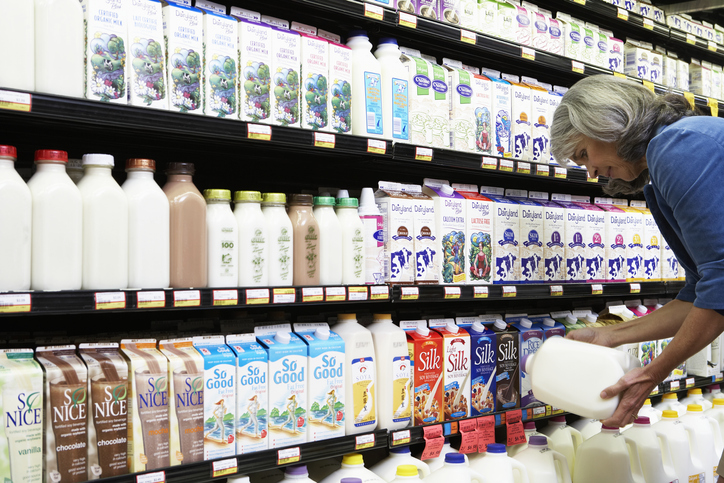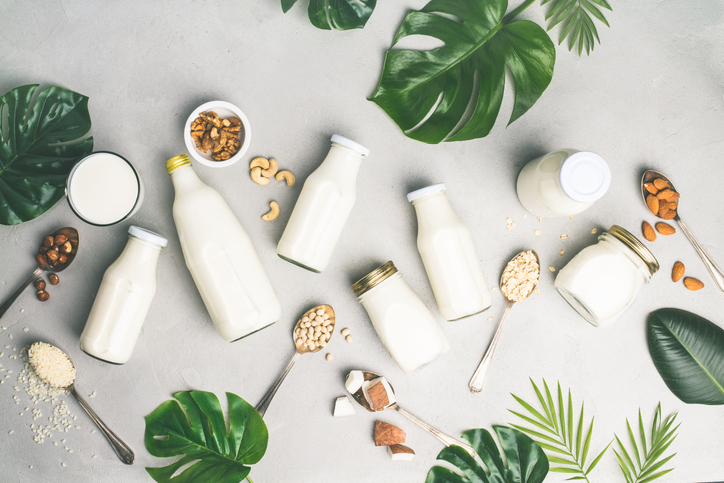Breast Cancer May Be Why You Want To Choose Milk Alternatives

Just when I think I’ve seen it all, I see something else that shocks me!
In this 2014 video, a 46-year-old, milk-obsessed woman shares that she drinks 10 pints of milk a day! Sure, cow’s milk contains essential vitamins and minerals that are good for our bones and overall health such as calcium, phosphorus, vitamin D and vitamin B12, however, a recent study found evidence suggesting that women who drink cow’s milk may be at an increased risk of developing breast cancer.

The study, which was conducted by researchers at Loma Linda University Health, “...found that even relatively moderate amounts of dairy milk consumption can increase women's risk of breast cancer—up to 80% depending on the amount consumed,” according to one report discussing the study.
One of the lead authors of the study said that drinking just one-third to one-fourth cup of dairy milk per day was connected to a 30 percent increased risk of breast cancer. One cup of dairy milk per day was associated with a 50 percent increase, and two to three cups per day jumped to a 70 to 80 percent increase.
There were not any significant associations between breast cancer and other dairy products such as yogurt and cheese.
According to the American Cancer Society, breast cancer is the second leading cause of cancer death in women.
Actress Shannen Doherty, 48, recently revealed that she had a stage 4 breast cancer relapse. In addition to this, a 22-year-old student shared her battle with stage 3 breast cancer after doctors told her that the lump in her breast was just a cyst. The truth is, cancer can happen to any of us.
We must be proactive.
“Fraser [the lead study author] said the possible reasons for these associations between breast cancer and dairy milk may be the sex hormone content of dairy milk, as the cows are of course lactating, and often about 75% of the dairy herd is pregnant. Breast cancer in women is a hormone-responsive cancer,” according to the report.
“Further, intake of dairy and other animal proteins in some reports is also associated with higher blood levels of a hormone, insulin-like growth factor-1 (IGF-1), which is thought to promote certain cancers.”
More research is needed, and this does not necessarily mean we should completely avoid milk and other animal products. I do, however, think it is important to practice moderation and, as always, speak with a competent healthcare professional about what your specific diet needs are. Perhaps if you already have an increased risk of developing breast cancer (maybe it runs in your family), you should not drink dairy milk at all.
And we really don't need cows milk.
There are so many great milk alternatives (which we have previously blogged about):
- Rice milk
- Oat milk
- Hemp milk
- Soy milk
- Almond milk
- Hazelnut milk
- Walnut milk
There are so many nutrient-rich, plant-based milks to choose from. There is really no need to go for cow’s milk, especially when these milk alternatives are often fortified with vitamin D, calcium and vitamin B12.
Again, speak with your doctor or a competent healthcare professional about which milk alternative is best for your specific dietary needs.
How else can we be proactive about breast cancer?
Because breast cancer is reportedly the second leading cause of cancer death in women, we must be proactive starting now!
Nutrition is key in helping prevent breast cancer as well as living an overall healthy lifestyle by exercising, maintaining a healthy weight, not smoking, drinking alcohol in moderation (if at all) and of course getting regular breast exams and mammograms.
For more information about how to be proactive about breast cancer, read here. It is also extremely important to maintain nutritional balance. Schedule routine nutrient tests in order to identify any nutrient imbalances or deficiencies you may have. If the test reveals you have too much or too little of a certain nutrient, a competent healthcare professional can work with you on making the necessary dietary changes and recommend quality supplements if necessary.
You may also want to consider ditching the hair dye.
Enjoy your healthy life!
The pH professional health care team includes recognized experts from a variety of health care and related disciplines, including physicians, attorneys, nutritionists, nurses and certified fitness instructors. This team also includes the members of the pH Medical Advisory Board, which constantly monitors all pH programs, products and services. To learn more about the pH Medical Advisory Board, click here.







